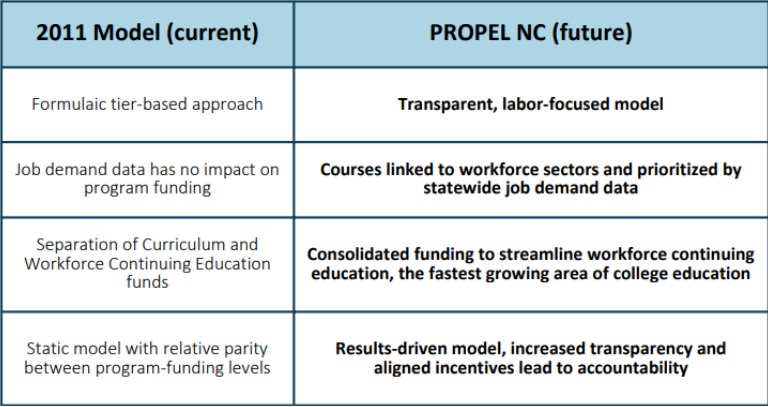Last month, the North Carolina Community College System (NCCCS) board voted unanimously to implement Propel NC, a new funding model that will incentivize enrollment in high-demand workforce sectors. The proposed plan will also increase base funding by 5.8 percent.
The North Carolina General Assembly will consider the plan and its funding requirements during the upcoming short session. NCCCS is requesting an additional $68.5 million in recurring funding to implement the workforce component of the model and $24.4 million to increase the per-student base funding.
The Propel NC funding model differs significantly from the one currently in use. The following table explains the differences. (Source: NCCCS.) Unlike the UNC performance funding model, NCCCS’s model does not use student outcome measures.

The workforce sectors that will receive special consideration under the new proposal were presented at a November State Board of Community Colleges meeting. They include “engineering and advanced manufacturing,” “trades and transportation,” “information technology,” “public safety and first responders,” two healthcare categories, two categories for “other technical courses,” and “customized training and small business center[s].” The relative weight of each category will be reevaluated every three years based on job demand and salary data.
The new funding model aims to incentivize enrollment in high-demand workforce sectors.The new model specifies that transfer and general-education sectors will maintain their current funding levels. In North Carolina, 31 percent of all first-time community college students transfer to a four-year institution within six years. More than half of all NCCCS students are adult learners (25+).
A document prepared by NCCCS staff touts the new model as a way to “position community colleges to be more nimble and responsive to their local employers’ biggest workforce needs by growing and sustaining training programs in the highest-demand and highest-wage sectors of our economy.”
In a press release from the System, NCCCS president Jeff Cox praised the proposed model. “Propel NC marks a significant shift towards a more industry-aligned educational approach, ensuring our graduates are primed for success in high-growth fields,” Cox said. “Propel NC is a game-changer for our students, for business and industry and for our state’s economic future.”
The release also reported that the initiative received unanimous support from the presidents of all 58 community colleges.
Jenna A. Robinson is president of the James G. Martin Center for Academic Renewal.

